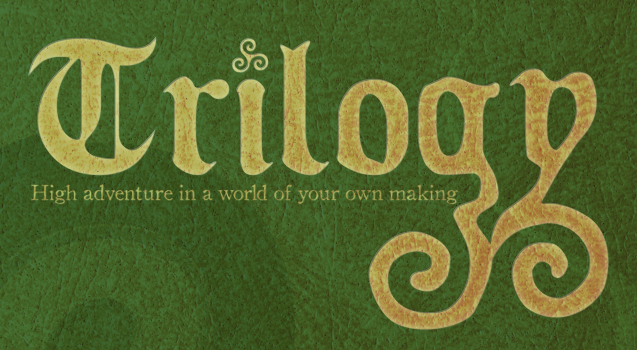Trilogy: Epic fantasy in worlds of your own making
Trilogy is a Tabletop RPG offering exciting, character-driven, fantasy campaigns set in a world you create in play.

Built on the well-known Powered By The Apocalypse framework, Trilogy is a GM-led game that works best with 3-6 players, including the GM. Although it takes inspiration from other games in that family, it marks itself out as a game designed for telling a wide range of stories within the fantasy genre. It can run epic quests, whimsical exploration, or gritty conflict, depending on the tone and setting you decide at the table.
Where most fantasy RPGs either offer a game setting - often with supplementary books of lore and background - or strongly imply one through the game text, Trilogy guides you through the process of collaboratively creating the world at the table before you create your characters and begin their story.
Trilogy can flex to fit so many different styles of play because your playbook, or Arc, represents your character’s role in the narrative rather than a traditional RPG character class. Some of these look very familiar - The Fighter, The Priest and The Magus are similar to traditional character classes, although distinctive in their own ways. Others, such as The Defeated (a character haunted by past failure struggling to become something new), The Volunteer (an enthusiastic recruit, learning to navigate the organisation they have become part of), or The Mentor (wise teacher to another character, powered by disappointment in their failures) are quite different. A character can go through up to three arcs during their career, making Trilogy an ideal choice for a longer campaign. The game includes twenty-one character arcs, along with guidance for creating your own.
Aside from the core structure of character arcs, Trilogy is built to keep play fun and flowing - a scene system draws a boundary between in and out-of-character play, while montages provide the opportunity to show the interesting parts of a journey or grand project without getting caught in the details. If the players choose to split the party for a few sessions, companion characters allow the players whose main characters are elsewhere to remain part of the game. If you want your campaign to feature mounts or vehicles, the game includes playbooks for those.
Although Trilogy requires a GM it is built with the understanding that they are also a player. The book is full of detailed examples of play, and the chapters on running the game are packed with transferable GM advice that will benefit any game you run. It aims to create minimal homework for GMs to ensure that running it is a pleasure rather than a chore, and to open the door to the joy of discovery taking place at the table.
Ben Moxon, the author of the game, was GM for the long-running Dungeon World Actual Play Crudely Drawn Swords and the podcast team have got back together to stream an example campaign. Shaped by Ben’s approach to creating compelling stories collaboratively at the table, Trilogy offers a structure to help you explore your own worlds, as broad and bright as your imagination.





